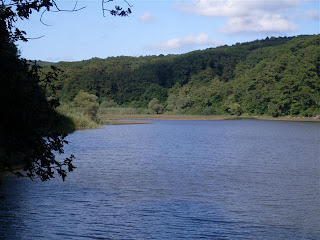 |
| The ensemble cast of Süleyman's Ottoman Court |
My Turkish isn't good enough to watch a series in the original language. Fortunately, one of the most popular Turkish TV series subtitled their first episode so that English-language audiences could decide for themselves if they would like more international selection on their television. I've watched the first and second episode. You don't need that much language as the story is universal: boy meets girl.
Local historians lift their nose at this show decrying that it has as much historical accuracy as a Phillipa Gregory novel, and that may be true. Do we really know if Roksalana's beau went to heaven or hell when he was killed? The details may be embroidered but the broad outlines of the story are true.
German-Turkish actress
Meryem Uzerli
as Hürrem
Besides the theme of boy meets girl, another added delight of this series is the Ottoman costumes, headgear, architecture, and interiors. The Ottomans really did wear the hats in the series that look like waste paper baskets and Jiffy Pop poppers.
The caftans! The divans! The carpets! It's all so evocative of a lost time when the "Orient mystique" of the harem intruiged all Westerners who came in contact with Turkish culture.
How popular is this series? It's credited with increasing Arab tourism to Istanbul by 50% this year. Here's the Wikipedia background on the incredible story of Süleyman and his beloved Roksolana, whom he nicknamed Hürrem, "the cheerful one:"
The "Magnificent Century" of the Ottomans refers to the reign of Sultan Süleyman the Magnificent , and the series dramatizes the intrigues of his harem and court. Most of the incidents and actions occurring are based on fictional stories of the Ottomans specifically Sultan Süleyman and his harem but these actions take place on the fixed time of this reign.
Is it universal that
all heroes arrive on a white horse?
Actor Halit Ergenç
as Sultan Süleyman
At the age of twenty-six, when his rule began, Sultan Süleyman sought to build an empire in this world more powerful and more extensive than Alexander The Great of Macedonia and to render the Ottomans invincible.For your enjoyment: episode one of "The Magnificent Century" with English subtitles. After you watch it, tell me if your TV choices would be enhanced by more shows from other countries, such as the Turkish tale contained in "The Magnificent Century." After all, there are many times in our lives when we can't travel. Why not make 'travel' come to us?
Throughout his 46-year reign, Sultan Süleyman became known as the greatest warrior and ruler of the East and West. The young Süleyman ascended to the throne after receiving the news of his crowning at a hunting party in 1520. Unaware that he would be embarking on a reign that would later be considered the pinnacle of Ottoman rule, he left behind his consort Mahidevran and their son, little prince Mustafa, at his palace in Manisa, and, accompanied by his close friend and companion Pargalı İbrahim, took the road to Topkapı Palace in İstanbul.
While they were on route, an Ottoman ship sailed off from Crimea across the Black Sea, bringing kidnapped Christian female slaves as gifts for the Ottoman palace. On this ship was Alexandra La Rossa, the daughter of a Ukrainian Orthodox minister, who saw her father mother, and fiance being killed while kidnapped. This young girl, who had been kidnapped from her family and sold to the Ottoman palace as a slave, would become Hürrem (Roksolana), the consort who so captivated Sultan Süleyman that he took the nearly unprecedented step of making her his wife. She would bear his sons and rule his empire together with him through bloodshed and intrigue.
As Sultan Süleyman ruled his empire, he allowed his great passion for Hürrem a heavy influence in his court.
The television series focuses on the relationships between the members of the imperial household, especially the romantic entanglements and rivalries. The animosity between Hürrem and Mahidevran, and Hürrem's rise as Süleyman's favorite while pregnant with his son, her fall from favor after her son's birth and her eventual return to grace, provide the main subject matter of the series. Significant subplots include the affection between the Grand Vizier and one of the ladies of the royal household and the tension between Christian Europe and the Ottoman Empire.




























 Who links to me?
Who links to me?
